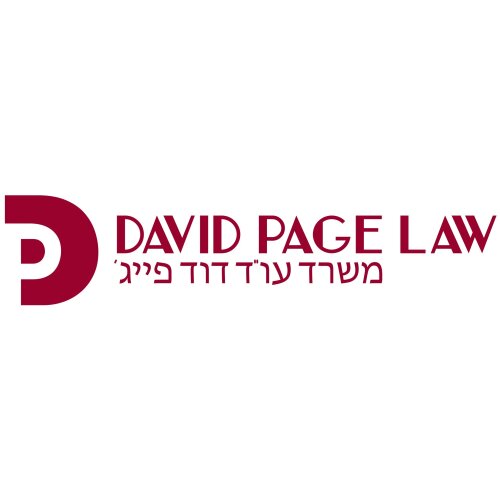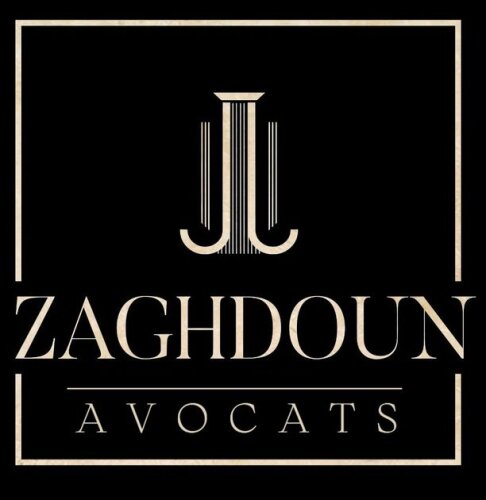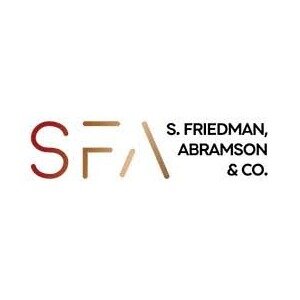Best Project Finance Lawyers in Jerusalem
Share your needs with us, get contacted by law firms.
Free. Takes 2 min.
List of the best lawyers in Jerusalem, Israel
About Project Finance Law in Jerusalem, Israel
Project finance is a specialized area of law that structures the funding of long-term infrastructure and industrial projects using a non-recourse or limited recourse financial structure. In Jerusalem, Israel, project finance is commonly used for large developments such as energy facilities, transportation projects, real estate, and public-private partnerships. The essence of project finance is the reliance on the projected cash flows of the project itself rather than the balance sheets of its sponsors. Legal frameworks play a crucial role in allocating risks, defining rights and responsibilities among stakeholders, and ensuring regulatory compliance.
Why You May Need a Lawyer
Navigating project finance in Jerusalem can be complex due to the high-value investments, intricate contracts, and compliance with multiple layers of regulation. You may need a lawyer if you are:
- Planning to develop or invest in a major infrastructure project in Jerusalem.
- Seeking to structure or restructure project finance agreements, including syndicated loans or bonds.
- Participating in public-private partnership (PPP) tenders or concessions.
- Negotiating contracts with contractors, suppliers, or government authorities.
- Ensuring compliance with local, regional, and national regulations specific to Jerusalem and the wider Israeli jurisdiction.
- Facing disputes related to project performance, payments, or default scenarios.
- Dealing with cross-border investment issues, including international financing or foreign investors.
Local Laws Overview
The legal landscape for project finance in Jerusalem, Israel is shaped by a mixture of local Jerusalem by-laws, Israeli national statutes, and sometimes international frameworks. Key legal considerations include:
- Companies Law: Governs the creation and operation of project companies, which are often special purpose vehicles (SPVs).
- Securities Law: Regulates the issuance of securities and investments associated with project finance.
- Contract Law: Israeli contract law applies to the various agreements needed, including construction, operation, and maintenance contracts.
- Planning and Building Law: Addresses land use, development permits, and zoning requirements in Jerusalem.
- Taxation: Tax structures for investments and project company profits are regulated by Israeli tax law and sometimes municipal tax ordinances in Jerusalem.
- Environmental Regulations: Emphasizes the environmental impact of large projects, requiring impact assessments and compliance with sustainability norms.
- Public Procurement Law: Governs tenders for public projects, relevant to PPPs and large infrastructure developments in Jerusalem.
International lenders and investors must also consider any bilateral or international treaties to which Israel is a party, especially when dealing with foreign investments.
Frequently Asked Questions
What is project finance and how is it different from traditional corporate finance?
Project finance uses the project's own assets and future cash flows as collateral for borrowing, rather than relying on the overall balance sheet of sponsors as in traditional corporate finance.
What types of projects in Jerusalem commonly use project finance structures?
Energy plants, transportation networks, real estate developments, water infrastructure, and telecom projects are typical candidates for project finance in Jerusalem.
Do I need to set up a special purpose vehicle (SPV) for project finance in Jerusalem?
Yes, most projects use SPVs to ring-fence project risks and separate them from the sponsors' other assets and liabilities.
What legal documents are essential in a project finance transaction?
Key documents include loan agreements, security documents, project contracts (like EPC and O&M agreements), shareholder agreements, and government permits or concessions.
How does public-private partnership (PPP) work in Jerusalem?
PPP projects in Jerusalem involve collaboration between government bodies and private entities, regulated under public procurement laws, with risks and rewards shared contractually.
What are the main risks in project finance transactions and how are they managed?
Risks include construction, operational, financial, legal, and political risks. These are allocated contractually among parties and often managed via insurance and guarantees.
Is foreign investment allowed in project finance projects in Jerusalem?
Yes, foreign investment is generally permitted, though it is subject to regulatory approvals, anti-money laundering rules, and sometimes sector-specific restrictions.
What is non-recourse or limited recourse financing?
Non-recourse or limited recourse means lenders can only claim against the project assets and revenues, not against the sponsors’ personal or corporate assets.
Are tax incentives available for project finance initiatives in Jerusalem?
Israel occasionally offers tax incentives for priority sectors like renewable energy and infrastructure, subject to eligibility and application processes.
What happens if the project fails or cannot repay lenders?
If the project fails, lenders have recourse only to the project’s assets and revenues, and generally cannot pursue the sponsors’ other assets beyond agreed guarantees.
Additional Resources
If you are seeking more information or support regarding project finance in Jerusalem, you may find the following resources valuable:
- Ministry of Finance - Department for Public-Private Partnerships (PPP)
- Israel Securities Authority
- Jerusalem Municipality - Planning and Building Department
- Israel Ministry of Justice
- Bank of Israel - Regulatory Division
- Israel Bar Association
- Israel Export and International Cooperation Institute (for cross-border projects)
- Major local law firms specializing in project finance
Next Steps
If you are considering a project finance venture or are facing a legal issue related to project finance in Jerusalem, Israel, consider the following steps:
- Gather all relevant project documentation, including contracts, investment plans, and correspondence with partners or authorities.
- Identify your main objectives and concerns, such as regulatory compliance, funding structure, or dispute resolution.
- Consult with a legal professional who specializes in project finance and is familiar with Jerusalem’s legal and regulatory landscape.
- Prepare specific questions or scenarios to discuss with your lawyer.
- Follow up on any required permits, registrations, or applications with the relevant local or national authorities.
- Stay informed about changes in regulations or market conditions that could impact your project.
Taking timely legal advice can help minimize risks, unlock financial options, and ensure your project is compliant with all relevant laws in Jerusalem, Israel.
Lawzana helps you find the best lawyers and law firms in Jerusalem through a curated and pre-screened list of qualified legal professionals. Our platform offers rankings and detailed profiles of attorneys and law firms, allowing you to compare based on practice areas, including Project Finance, experience, and client feedback.
Each profile includes a description of the firm's areas of practice, client reviews, team members and partners, year of establishment, spoken languages, office locations, contact information, social media presence, and any published articles or resources. Most firms on our platform speak English and are experienced in both local and international legal matters.
Get a quote from top-rated law firms in Jerusalem, Israel — quickly, securely, and without unnecessary hassle.
Disclaimer:
The information provided on this page is for general informational purposes only and does not constitute legal advice. While we strive to ensure the accuracy and relevance of the content, legal information may change over time, and interpretations of the law can vary. You should always consult with a qualified legal professional for advice specific to your situation.
We disclaim all liability for actions taken or not taken based on the content of this page. If you believe any information is incorrect or outdated, please contact us, and we will review and update it where appropriate.

















